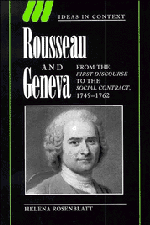Book contents
- Frontmatter
- Contents
- Acknowledgments
- Note on translation
- List of abbreviations
- Introduction. Rousseau in a Genevan context
- 1 The formation of a “citizen of Geneva”
- 2 Rousseau becomes Rousseau, 1751–1754. Geneva, doux commerce, and Rousseau from the First to the Second Discourse
- 3 Rousseau and natural law: the context
- 4 Rousseau and natural law: the Second Discourse
- 5 The “invisible chain”: Rousseau and Geneva from the Second Discourse to the Social Contract
- 6 The Social Contract
- Epilogue
- Select bibliography
- Index
- IDEAS IN CONTEXT
6 - The Social Contract
Published online by Cambridge University Press: 28 October 2009
- Frontmatter
- Contents
- Acknowledgments
- Note on translation
- List of abbreviations
- Introduction. Rousseau in a Genevan context
- 1 The formation of a “citizen of Geneva”
- 2 Rousseau becomes Rousseau, 1751–1754. Geneva, doux commerce, and Rousseau from the First to the Second Discourse
- 3 Rousseau and natural law: the context
- 4 Rousseau and natural law: the Second Discourse
- 5 The “invisible chain”: Rousseau and Geneva from the Second Discourse to the Social Contract
- 6 The Social Contract
- Epilogue
- Select bibliography
- Index
- IDEAS IN CONTEXT
Summary
Scholars have noted the paradoxical blend of antiquity and modernity in the Social Contract. On the one hand, Rousseau showed himself to be “a thoroughgoing modern”: he took as his point of departure the premise of individualism and subscribed to the notion of social contract associated with the school of natural law. Yet Rousseau's primary concern was with the theoretical justification of a republic and in the Social Contract he offered the “ideal of the ancient Polis … as his alternative to the modern liberal state.”
The political doctrines of republicanism and modern natural law seem to be at opposite poles of one another. The republican tradition is based on the ideas of virtue and community and sees love of one's country and identification with the community as the essential conditions for a just political order. The political doctrine of natural law, however, is based on the notion of self-interest and sees the main role of the State as being the protection of private interests. Rousseau's adoption of both languages in the Social Contract has therefore led to a certain amount of scholarly confusion.
Some have attributed Rousseau's unusual blending of the languages of republicanism and social contract theory to his penchant for paradoxes or his “anachronistic utiopianism.” But with knowledge of the Genevan context, Rousseau's attempt to “do the impossible,” to be a contractualist and a republican at the same time, is understandable. In Geneva, the republic needed to be refounded. Traditional republican ideals had to be updated and modernized so as to be relevant once again.
- Type
- Chapter
- Information
- Rousseau and GenevaFrom the First Discourse to The Social Contract, 1749–1762, pp. 241 - 268Publisher: Cambridge University PressPrint publication year: 1997



